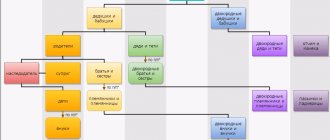The procedure for the adoption of children is regulated by the rules of Articles 124 and 125 of the Family Code of the Russian Federation (FC RF). One of the legal consequences of adoption is the termination of property and non-property rights and obligations in relation to blood relatives . An exception is provided for cases where one person (male or female) acts as an adoptive parent.
Article 1147 of the Civil Code of the Russian Federation (Civil Code of the Russian Federation) determines the rights of adopted children and adoptive parents to inheritance in the event of the death of one of them. According to it, the adopted child receives all the rights and obligations that the adoptive parent’s relatives by blood have (clause 1 of Article 1147 of the Civil Code of the Russian Federation).
If the property relations of the adopted child with one of the parents have been preserved, then he has the right to receive an inheritance after their death or the death of their relatives. He also retains the rights to inherit the property of the adoptive parent . In turn, blood parents and their relatives receive the right to inherit after the death of the child or his descendants.
The concept and procedure of adoption
Article 124 of the RF IC defines the concepts of adoption. It includes the placement of children whose parents cannot or do not want to provide custody of them. From this article it follows that only a minor child can be adopted . Adoption is carried out only in his interests and in compliance with the rules of paragraph 1 of Art. 123 RF IC. Only persons who have been recognized as capable of providing the child with the necessary conditions act as adoptive parents. Adoption of siblings into different families is not allowed . The exception is cases when the division is made in the interests of the adopted children.
The procedure for adoption is determined by Art. 125 of the RF IC, from which it follows:
- adoption can be carried out only at the request of a citizen acting as an adoptive parent. The adoption procedure must comply with the rules of current legislation. The decision to hand over a child to a person(s) for adoption is made by the court;
- representatives of the guardianship and trusteeship authority make an opinion on the ability of the adoptive parent to provide the child with conditions consistent with his interests;
- the transfer of a child for adoption and control over the conditions in which he lives and is raised within the borders of the Russian Federation is determined by the Government of the Russian Federation;
- on the day when the court decision on adoption comes into force, the adopted person and the adoptive parent receive the rights and obligations established by law in relation to each other. Within three days after this, the court sends the corresponding document (extract) to the civil registry office;
- the fact of adoption is subject to state registration in the prescribed manner.
Posthumous establishment of paternity
The circumstances preceding posthumous paternity registration may be as follows:
- The parent recognized the child and intended to raise him, but did not have time to contact the registry office. In this case, the court establishes the fact of recognition of paternity in accordance with Art. 50 IC RF.
- The man died before the baby was born or did not recognize the relationship. Then paternity is established in accordance with Art. 49 RF IC.
It is necessary to apply to the court with an application drawn up in accordance with Art. 131 Code of Civil Procedure of the Russian Federation. The document is submitted at the place of residence of the plaintiff.
Application for posthumous paternity establishment in court:
Required documents
Without strong evidence of paternity, the court will not grant the petition, so you should carefully prepare for the process. In the claim, for example, you can indicate: exactly when the pregnancy occurred (information confirmed with an issued medical certificate), how the father reacted to the news of the pregnancy, and why he did not formalize paternity.
Documents submitted with an application for recognition of paternity after death:
- death certificate of the testator;
- birth certificate;
- a certificate from the place of residence proving the fact of cohabitation;
- certificate of family composition.
It is also necessary to collect evidence of close relationships. The following are submitted to the judge:
- letters on paper, printouts of online correspondence between parents;
- joint photos;
- video filming with father;
- postcards with the signature “to son (daughter) from dad”;
- comments to photos on social networks;
- testimony of witnesses: neighbors, preschool teachers, teachers;
- checks, receipts for the father’s payment for classes in clubs and sections, purchases of things and toys.
The authenticity of the material provided is verified in court. If any doubts arise, an additional examination can be initiated.
Genetic examination for inheritance
If paternity is confirmed as a result of a DNA examination, an illegitimate child will be able to:
- change surname and patronymic;
- communicate with your father's relatives;
- receive benefits related to the loss of a breadwinner or other payments if the father died from violent acts committed by third parties;
- receive the father's inheritance among the first-priority applicants according to the law.
As soon as the court decision comes into force, you must contact the registry office and obtain a new birth certificate with a record of the father.
After this, regardless of the moment of opening of the inheritance, the child’s representatives have the right to declare his rights to the property. There will be no need to reinstate the deadline.
Cases regarding the inheritance of property by an illegitimate child can proceed unhindered if the interested parties recognized the child as their relative, or with a lot of obstacles if other legal successors resist and do not want to lose part of the benefits due. It must be remembered that it is never too late to formalize paternity, even if the citizen is already 18 years old. It depends on this whether the descendant will be able to receive the valuables he has acquired from his father, and whether his mother will issue state payments for the maintenance of the child.
When the father is alive, all disputes are easier to resolve. If time is lost, you will have to go to court. The procedure for recognizing paternity and subsequent registration of inheritance rights is long and complicated and requires knowledge in the field of law.
Consequences of adoption
The legal consequences of adopting a child are determined by Art. 137 RF IC. Based on it, adopted children and their offspring are equal to blood relatives in relation to the adoptive parent and his relatives. Both parties receive property and non-property rights and obligations in relation to each other. In this case, the corresponding relationship between the child and his parents by blood is terminated. However, if the adoptive parent is one person, relations with the father or mother by blood can be maintained if they wish .
The parents of the father or mother by blood (grandmother or grandfather), in the event of the death of the latter, can retain the rights of the adopted child to inherit. At the same time, he is not deprived of the corresponding rights and obligations in relation to the adoptive parent.
The consequences of adoption begin after the court decision comes into force .
They do not depend on whether changes have been made to the entry in the child’s birth documents.
Is it possible to deprive an adopted child of inheritance rights?
During his lifetime, the testator can dispose of the property at his own discretion: sell, donate or bequeath. After the death of the adoptive parent, the heirs of the first priority may apply to the court with a request to deprive of their rights. Main reasons:
- Malicious evasion of duties. If the heir was awarded alimony by court, and he evaded paying it, then the chances of being deprived of his property share increase significantly. Parents deprived of parental rights cannot claim their children's inheritance.
- Recognition as unworthy. Most often, heirs whose rights have been infringed sue. If they manage to prove that the heir acted unlawfully (for example, the testator was regularly attacked by the adopted child), then the applicant is deprived of the inheritance.
- Appeal. Citizens who were deprived of an inheritance without writing it in their wills turn to the court. Such claims are satisfied periodically. Applicants usually try to prove that the testator was insane at the time the document was signed, or that the will was written under duress.
Inheritance between an adopted person and his adoptive parents
Based on paragraph 1 of Art. 1147 of the Civil Code of the Russian Federation, the adopted person and the adoptive parent (adoptive parents) are equated to blood relatives . The property and non-property relations arising as a result also extend to the relatives of the adoptive parent and the descendants of the adopted person.
In the event of the death of one of the adoptive parents, the adopted person receives a share in the inheritance as a first-priority heir by law (Article 1142 of the Civil Code of the Russian Federation). It is also subject to the rules of Articles 1146 and 1149 of the Civil Code of the Russian Federation. If, in accordance with Art. 137 of the RF IC, the adopted person retains the rights to inherit after one of the blood parents, he does not lose the corresponding rights in relation to the adoptive parent.
Obligatory heirs - list
So, who is entitled to that very share of the inheritance, called obligatory?
The legislator does not limit anyone in the choice of persons and organizations to whom he, if desired, bequeaths his property.
But at the same time, particularly vulnerable groups of citizens are identified, and they have the right to receive some share of the property, regardless of the terms of the will.
This limited circle of persons is described by the Civil Code of the Russian Federation in Article 1149. Let us present it:
- Children, including adopted children and illegitimate children, who have not reached the age of majority by the day of the parent’s death, the main thing is that paternity is established by law.
- Children with disabilities of all groups at any age.
- Children who have the right to receive an old-age pension at the time of the death of a parent (women 55 years of age and older, men over 60 years of age).
- The testator's parents who were declared incompetent or incapacitated, including adoptive parents.
- The spouse of the deceased, who is over working age or has a disability.
- Dependents of the deceased - his adopted children, grandchildren under guardianship, etc.
USEFUL INFORMATION: Complaint to the tax office: sample
Obviously, the main criterion is the permanent disability of the listed persons as a result of age and health problems.
An equally important factor is that these persons were incapacitated for at least a year before the death of the testator. Only then do they have legal grounds to have the status of obligatory heirs.
It is important to know: the dependent specified in the will will certainly receive his. Dependents not named in this document will have this right only if they lived in a common area with the testator for more than one year, and he supported them.
Inheritance between an adopted child and his parents
According to paragraph 2 of Art. 1147 of the Civil Code of the Russian Federation, after adoption, a child and his offspring do not have the right to receive an inheritance from blood relatives. An exception is possible in case of inheritance by will or in the case specified in paragraph 3 of this article.
Clause 3 of Art. 1147 of the Civil Code of the Russian Federation provides for the possibility of preserving the relationship between an adopted child and one of the parents.
If the necessary conditions are met, the adopted person and his descendants have rights to inherit after blood relatives through one of the parents. The latter, in turn, reserve the right to inherit after him or his descendants on the basis of the articles of Chapter 63 of the Civil Code of the Russian Federation. The adoptee, who has maintained relations with blood relatives, also retains the possibility of inheritance after the adoptive parent , who is equal to the parent by origin.
From paragraph 3 of Art. 137 RF IC follows:
- if a woman acts as an adoptive parent, then, at the request of the child’s father, she can retain her rights and obligations towards him;
- If a man acts as an adoptive parent, then, at the request of the child’s mother, he can retain the rights and obligations towards her.
Is it possible to deprive an adopted child of inheritance rights?
The same rules apply to adopted children as to relatives:
- in any case, the minor child will receive his share (general or obligatory) in the inheritance;
- An adopted child can be recognized as an unworthy heir only when he reaches 18 years of age and only in court.
The procedure for disinheritance is discussed in detail in the material “How to recognize an heir as unworthy?”
According to the law, the adoptive parent has the right to disinherit an adopted child, but provided that the adopted person is an adult. If the child is under 18 years old, then he has the right to receive a mandatory share of the inheritance.
The legislation provides two grounds for deprivation of inheritance:
- the will of the adoptive parent expressed in the will;
- declaring an heir unworthy in court.
When depriving an adopted child of an inheritance, the adoptive parent is not obliged to explain the reason for his action, since he disposes of his property at his own discretion. Inheritance rights can be deprived not only through a will, but also if the heir is deemed unworthy, which automatically deprives him of property rights.
Unworthy persons include adopted children who have committed deliberately illegal actions against the adoptive parent:
- an attempt to appropriate the share of another heir;
- desire to increase the share of inheritance;
- influencing the adoptive parent;
- resistance to the will of the adoptive parent, expressed in the will drawn up by him.
Heirs who do not fulfill the
maintenance responsibilities
adoptive parent. In this case, we are talking about appointing an adopted person as a guardian over the testator.
Possibility of preserving hereditary relations between the adopted person and his blood relatives
Clause 3 of Art. 1147 of the Civil Code of the Russian Federation and Art. 137 of the RF IC provides for the possibility and requirements for preserving hereditary property and non-property relations between an adopted child and his relatives by origin. Article 137 of the RF IC includes the following provisions:
- if a child is adopted by one person , his hereditary relationship with one of the parents can be preserved if they wish. The father of the adopted child can make an appropriate decision if the adoptive parent is a woman. His mother is given this right if the adoptive parent is a man;
- in the event of the death of one of the adoptee’s blood parents , at the request of the child’s grandfather or grandmother (father or mother of the deceased), inheritance rights are retained in relation to the parent’s blood relatives;
- the final decision to preserve the relationship between the parents and the adopted child is determined by the court and indicated in the relevant documents.
Procedure for inheritance by adopted children under a will
The testamentary inheritance procedure is simplified by the fact that the process involves a document reflecting the order of distribution of the inheritance between descendants. In general, the testamentary process of transferring inheritance is regulated by the provisions of Chapter 62 of the Civil Code of the Russian Federation. The algorithm for the actions of an adopted child when registering an inheritance under a will is as follows:
- Determine the location of the will - you can find it in the personal belongings of the deceased, in the archives of a notary, or in another place that the testator spoke about during his lifetime.
- Write an application and collect the required package of documents.
- Contact a specialist, handing over all the papers to open an inheritance case. As part of this procedure, the will is announced and all the heirs who will subsequently receive the property gather.
- Six months later, each of the heirs receives a certificate of inheritance.
- Based on the submitted documents, you should register your ownership rights to the property.
The problem of confirming the fact of family relationships
The adoptive parent, at his own request, may request a change in the child’s birth record in the civil registry office. Thus, all information about blood relatives can be lost, but the secret of adoption is preserved. On the other hand, if the records of the birth of the child have not been changed by other persons, confirming the relationship does not cause difficulties.
When inheriting from an adoptive parent, the adopted person must provide documentary evidence of the fact of adoption . This could be an adoption certificate or a court order. If the fact of kinship or adoption is not proven, the adopted person will not be able to inherit as an heir by law.
Problems are observed in cases where the adoption has been annulled and the child must be returned to the natural parents. Inheritance relations between them are restored only after the court makes a decision on this . The right to a share in the adoptive parent's inheritance is also canceled only after the approval of the court decision.









